Inspired by the Human Library events run by Bolton NHS Foundation Trust and the Living Library event at Wirral University Teaching Hospitals NHS Foundation Trust I approached the Head of Diversity, Inclusion and Blended Learning to see whether we could run something similar in our trust. We agreed that it would be a great way to bring staff from different areas of the trust together and enable them to hear the lived experience of colleagues in their own words. To date we have run two half-day events in July and October 2019 and this article aims to share our learning from them.
How it works
It’s a simple idea, staff volunteer to be “human” books and other staff who work at the Trust come along to “borrow” a human book to “read”, which basically means having a conversation. The idea comes from the Human Library project, which aims to challenge stereotypes and discrimination through dialogue. Each “human” book writes a summary of their experiences outlining their daily activities, what they do in their spare time, one thing that may surprise people, an example of discrimination faced and their values; they also choose a title for their story, which can stimulate the discussion.
On arrival the “readers” are signed in and given the book summaries and some information about unconscious bias which they can look at over tea and biscuits. They are also given some ideas of questions that they might want to ask to get the conversation started. Readers select the book based on the summary alone, names and job titles are not given at this stage and then the library staff or event facilitators issue the book to the reader and make introductions. During the first event, some conversations lasted for 40 minutes meaning that readers were often waiting to speak to their book of choice. It also meant that books had little rest between conversations and whilst some books were OK with this, others found it tiring. For the second event conversations were limited to 20 minutes and books were made to take a break between each which worked much better.
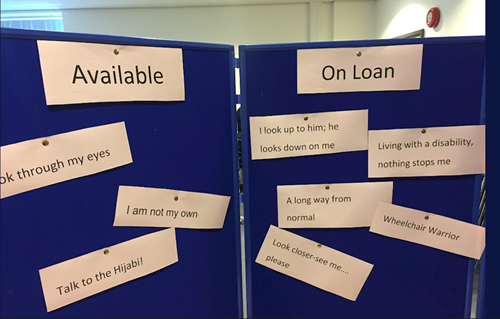
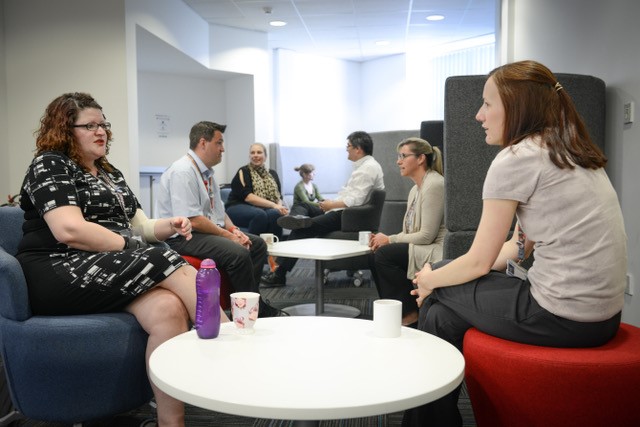
Promotion
We initially planned to run the event in March 2019 to coincide with Zero Discrimination Day, but we had very little interest despite lots of promotion so we decided to postpone. We thought about how we could engage people in the project and encourage them to come along. It was clear that people didn’t really understand the concept and felt a little wary about the whole thing. By this point we had identified five or six human books, so we invited them along to have some photos taken and film some introductions. This turned out to be a great opportunity for the books to meet each other and meant that we developed some useful promotional materials including a number of videos to explain the concept and introduce some of our human books:
Introduction to the Living Library
Book by Emma
Book by Julie
Book by Barrie
Preparing the human books
We wanted to meet all of our human books together before the event in order to prepare them but unfortunately we could not manage to do this. I met all of the books individually or in pairs before the event and covered a range of topics including logistics for the day, conversation openers, psychological safety and how we can support them on the day, how to close a conversation and unconscious bias. After the first event, we held an after action review with the books and it was clear that we didn’t plan enough time at the beginning of the event for the books to meet each other properly and to go through logistics. For the second event we gave ourselves 45 minutes at the beginning to get the books together, run through logistics, discuss how they were feeling and let them get used to the layout of the room. This worked much better, but although some books did manage to book each other for conversations, others would have liked more time to speak to each other, so we are planning another Living Library event in 2020, just for the books to borrow each other and share their stories.
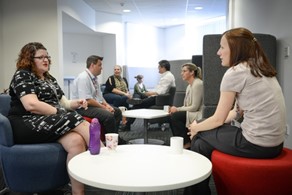
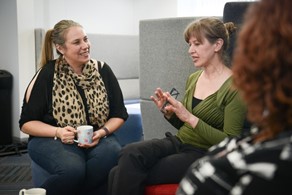
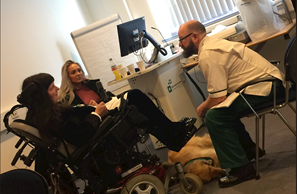
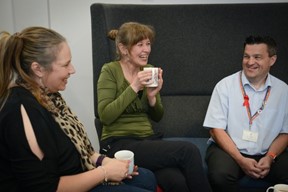
The location
We thought long and hard about the location and decided that the library wouldn’t give us enough space and would be disruptive for other users. For the first event, we hired a seminar room which had lots of tables in it and in our after action review with the books, we felt that a much bigger space was needed. It was too cramped and the number of conversations happening simultaneously meant that it was difficult to stay focused at times. Feedback also suggested that barriers between conversations would be useful to give books and their readers some privacy and help manage the noise. For the second event we booked a much larger open-plan lecture room, we set up eight stations for books and a “holding area” for the readers and this layout worked well. It is really beneficial to think about the space and get it right – this was a key piece of learning for us.
Evaluation and feedback
All in all the two events were a great success, we had 14 human books, 24 readers and managed 48 conversations. After each event we held an after action review with the books and the discussions led us to make the following changes:
• Room layout – we identified a bigger space and made discreet stations for each book to ensure privacy / noise control
• Conversations – we continued checking in and monitored the length of the conversations, limiting them to 20 minutes with a break between each. We provided opportunities for books to borrow each other.
• Information – we shared more information with books before and during the event e.g. all book summaries and conversation openers
• Comfort – we need to provide more comfortable seating and water stations for each of the books
• Psychological safety - we need to consider the psychological safety of readers and provide support materials
Everyone enjoyed the event and agreed that it would be something they would be involved in again. The books felt that they had some good open conversation with readers who were prepared to ask questions, you can read Zareena Mulla’s experience about being a book here. We also asked the readers to complete evaluation forms, it is worth noting that a number of our readers were students, and it is worth checking out Bolton’s experience of setting up a Human Book Club for Healthcare Learners. The event went down really well with everyone agreeing that the event was a good way to challenge prejudice and that it was OK to ask the questions that they wanted. Some of the comments show that the event had a positive impact, although one commenter noted that there was an element of “preaching to the converted” so we need to consider how we attract a wider audience.
“The mix of ‘human books’ and their stories helped to see what kind of prejudice goes on”
“People’s personal stories about discrimination they have faced is better to learn from than any e-learning”
“Really enjoyed talking to everyone and asking questions, them asking my perception helped me too”
“The way that staff treat other staff members (not just patients) is very important and this has helped me to understand this”
Next steps
The Living Library is a great way of opening up conversations between staff members who wouldn’t normally meet each other and through these conversations enable us to support colleagues in the workplace, share best practice and positively challenge prejudice or discrimination in a safe environment. We are hoping to run 3 more events in 2020, including one just for the books so that they can learn from each other.
Tracey Pratchett
Lancashire Teaching Hospital NHS Foundation Trust

